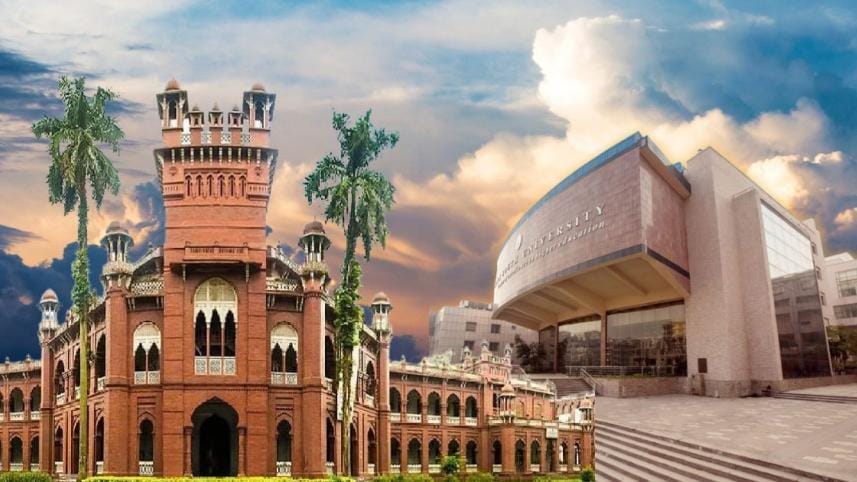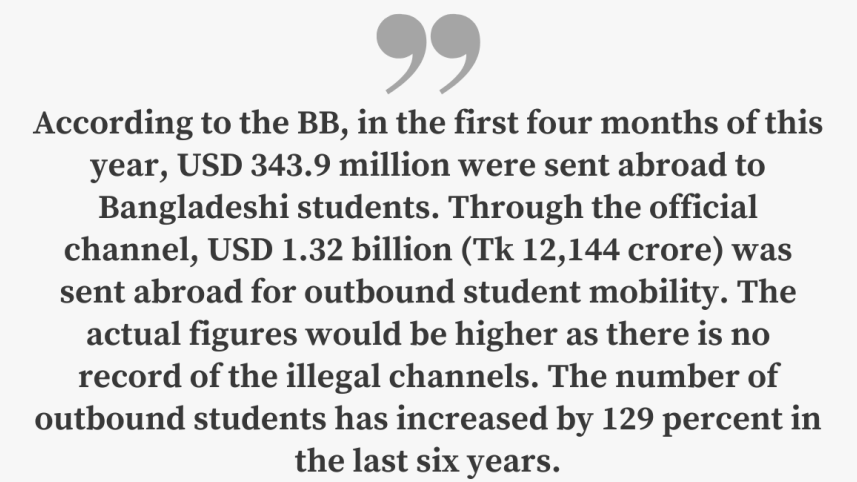University ranking announcement and the morning after

The oldest private university in Bangladesh is giving its oldest public university a run for its money. They are the only two educational institutions to be featured in the top 800 of a world ranking estimated by Times Higher Education (THE). To see these local universities in the same global category provokes more questions than answers.
These two universities – one in Dhaka North, the other in Dhaka South – are separated by thick traffic worth two-three hours on the road and a culture of mutual dismissiveness. Whether the ranking agency will thaw the frozen relationship is a matter to be seen. The achievement of North South University (NSU) cannot be brushed aside as it devised and pursued a strategic plan to achieve its status in the elite club of universities. Three other Bangladeshi universities, all technical in orientation – Bangladesh University of Engineering and Technology (Buet), Bangladesh Agricultural University (BAU), and Khulna University of Engineering and Technology (Kuet) – have been featured in the 1200-1500 range. The overall performance is dismal. It begs the question: why are the other leading public universities and notable private universities not there?
Established in 1921, Dhaka University (DU) has a clear advantage in the five areas in which THE measures the performance of a university: teaching, research, citations, international outlook, and industry income. With its government funding, DU caters to 38,172 students and has a fleet of 2,200 teachers. Conversely, NSU, established in 1992, has 20,596 students with a teaching team of 386 full-time and 362 part-time teachers. As per the UGC's 2019 record, DU spent Tk 52.02 crore in research and had 472 publications, while NSU spent Tk 65.32 crore in research and claimed 1,135 publications.
It needs to be mentioned that a university needs to have 300 indexed publications a year for five consecutive years to be considered for THE ranking. NSU has persistently nurtured a research culture to be at par with a university that is 70 years older than it. The presence of three technical universities in the ranking suggests that they have the required number of publications, which many other universities lack.

It is refreshing to see that DU is feeling the pressure to excel. Recently, it initiated an annual performance goal for each academic department and liberalised its international outlook. According to THE, 7.5 percent marks are given for international outlook based on the proportion of international students, international staff and international collaboration. This is an area in which private universities have greater flexibility. In terms of teaching, which makes up for 30 percent of the ranking scale, the subcategories are reputation survey, staff-to-student ratio, doctorate to bachelors ratio, doctorate awarded to academic staff, and institutional income.
Given the government's policy of not allowing private universities to award doctorate degrees, private universities are missing out on the learning environment category. The same goes for industry income, amounting to 2.5 percent of THE ranking metrics, in which private universities are handicapped as they are not allowed to run for-profit institutes. But a lot depends on the reputation survey (15 percent in teaching and 18 percent in research), where the alumni in the job market contribute to the overall image of the participating university.
NSU's success will inspire some other private universities to join the world ranking. They already have a clear strategic vision in place. The share of student distribution in the tertiary system, if we exclude the colleges under the National University, is almost equal. However, there persist some misconceptions about private universities as they are subjected to some additional regulatory monitoring that handicaps their growth.
The introduction of private universities has stopped many students from going abroad as they could get quality education within the country and save money because of the credit-transfer scheme. In many cases, the curricula of public universities are not updated. Most of our programmes are not accredited. The government has initiated the Bangladesh Accreditation Council, which is likely to address the issue and bring the public and private universities under the same measurement scale.
For the tertiary sector to grow, there has to be a common and consistent policy. Some older universities behave as if they are above any scrutiny. Their claim to vaunted prestige is now being rightfully challenged and claimed by newer universities. It is about time these divisions were eschewed as the teachers who teach and the students who learn are all citizens of this country. They all deserve fair and equal treatment. For instance, UGC research and travel grants are given only to public university teachers. UGC allows PhD programmes to be offered only by public universities.
With the kind of intellectual resources that the leading private universities have, either through reverse brain drain by accommodating returning expatriate scholars or through retaining the best teachers who have retired from the public system, they can easily attract both local and international students in PhD programmes. Of course, UGC can apply strict regulatory criteria for awarding the degree.
In absence of such open-mindedness, we are seeing many of our local students going abroad. Malaysia has become the second largest student destination for Bangladeshi students, which used to be a source country in the 1980s. According to the Bangladesh Bank, in the first four months of this year, USD 343.9 million were sent abroad to Bangladeshi students. Through the official channel, USD 1.32 billion (Tk 12,144 crore) was sent abroad for outbound student mobility. The actual figures would be higher as there is no record of the illegal channels. The number of outbound students has increased by 129 percent in the last six years.
The success of DU and NSU shows that with the right attitude, we can create world-class universities to cater to our local needs and retain foreign currencies from being siphoned out. But to benefit from the system, we need a radical change in the mindset of the policymakers and the government.
Dr Shamsad Mortuza is a professor of English at Dhaka University.




 For all latest news, follow The Daily Star's Google News channel.
For all latest news, follow The Daily Star's Google News channel. 
Comments